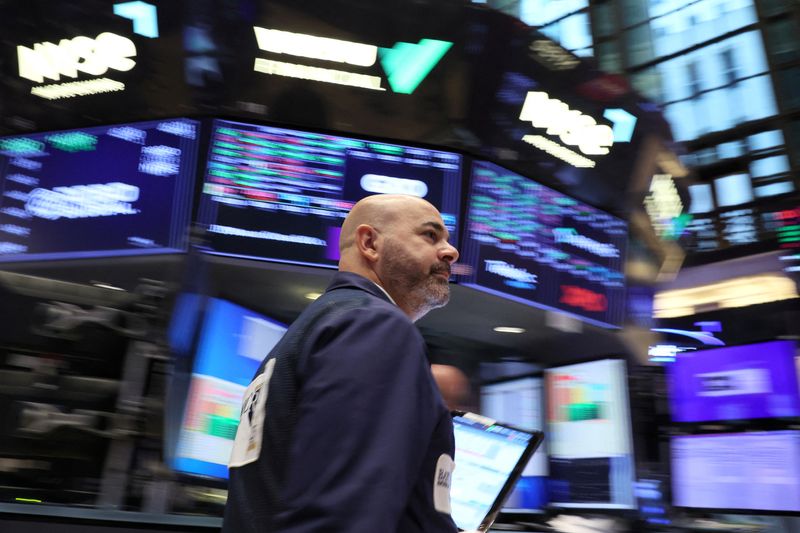By Stephen Culp
NEW YORK (Reuters) - Wall Street rallied on Monday, kicking off what promises to be a hectic week that includes a heavy earnings docket, economic data and the Federal Reserve's two-day monetary policy meeting.
All three major U.S. stock indexes closed up more than 1%, bouncing back from the previous week's sell-off. Interest rate sensitive megacap stocks, led by Microsoft Corp (NASDAQ:MSFT), Amazon.com (NASDAQ:AMZN), and Apple Inc (NASDAQ:AAPL) provided the most upside muscle.
"Today is an earnings rebound," said Oliver Pursche, senior vice president at Wealthspire Advisors, in New York. "The market got oversold, and the reality is that earnings have been pretty good, the U.S. economy continues to chug along, and is likely to do so in the fourth quarter and into the first part of next year."
Third-quarter earnings season, firing on all cylinders, has reached its halfway point, with 251 of the companies in the S&P 500 having reported. Of those, 78% have beaten Wall Street estimates, according to LSEG.
Analysts now expect, on aggregate, annual third quarter S&P 500 earnings growth of 4.3%, a marked improvement over the 1.6% year-on-year growth seen at the beginning of October.
Investors have shown “less pessimism," Pursche added. "First- and second-quarter calls had a more negative tone. There was anxiety over interest rates, Fed policy, the recession that never came."
In the coming week, Caterpillar Inc (NYSE:CAT), Apple Inc, Pfizer Inc (NYSE:PFE) and Starbucks Corp (NASDAQ:SBUX) are among the higher profile companies expected to post results.
On Tuesday, the Federal Open Markets Committee (FOMC) is expected to convene for a two-day monetary policy meeting, which is expected to culminate in a decision to let the Fed funds target rate stand at 5.25%-5.50%.
Investors will scrutinize the accompanying statement and Fed Chair Jerome Powell's subsequent Q&A session for clues regarding the central bank's path forward with rates.
"The Fed wants to see the cumulative effects of their rate hikes on the economy but they’ve also said they’re prepared to over-shoot in an abundance of caution, as long as inflation is above 3%," Pursche said.
The Bank of England and the Bank of Japan would also be announcing rate decisions this week, with the latter set to consider a further adjustment to its yield curve control (YCC) framework, according to a Nikkei report.
Closely watched economic data is on tap this week, culminating in the U.S. Labor Department's October employment report due on Friday.
Geopolitical strife arising from the Israel-Hamas conflict as well as a surge in Treasury yields have weighed on stocks in recent weeks, dragging the benchmark S&P 500 down about 10% from its intraday high in July.
The Dow Jones Industrial Average rose 511.37 points, or 1.58%, to 32,928.96, the S&P 500 gained 49.45 points, or 1.20%, to 4,166.82 and the Nasdaq Composite added 146.47 points, or 1.16%, to 12,789.48.
All 11 major sectors of the S&P 500 ended the session green, with communication services enjoying the biggest percentage gain, jumping 2.1%.
McDonald's (NYSE:MCD) reported better than expected quarterly results, driven by demand for its more affordable food as consumers contend with ongoing inflation pressures. Its shares gained 1.7%.
Onsemi tumbled 21.8% after the chipmaker forecast weak fourth-quarter revenue on slowing demand for electric vehicles.
Western Digital Corp (NASDAQ:WDC) jumped 7.3% after the company disclosed plans to separate itself into two independent public companies.
Realty Income (NYSE:O) slid 5.7% following its announcement that it would by Spirit Realty Capital (NYSE:SRC) in an all-stock deal valued at $9.3 billion. Spirit Realty Capital advanced 7.9%.
Advancing issues outnumbered declining ones on the NYSE by a 2.15-to-1 ratio; on Nasdaq, a 1.62-to-1 ratio favored advancers.

The S&P 500 posted no new 52-week highs and 44 new lows; the Nasdaq Composite recorded 14 new highs and 363 new lows.
Volume on U.S. exchanges was 10.16 billion shares, compared with the 10.67 billion average for the full session over the last 20 trading days.